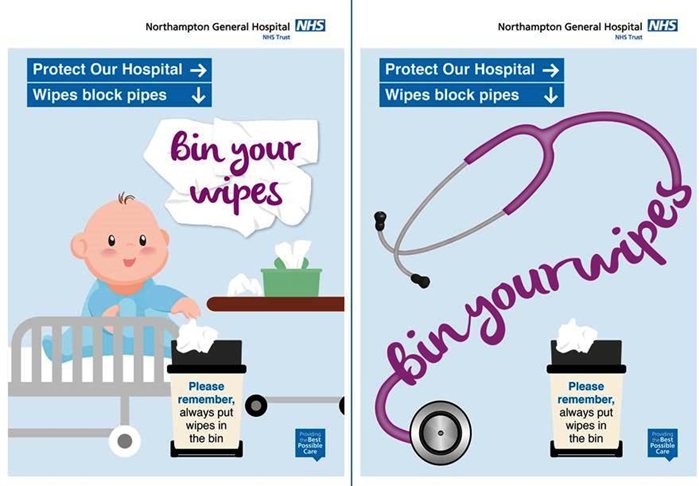Wipes block pipes

Wipes block pipes – that’s the message from Northampton General Hospital and Anglian Water as they join forces to raise awareness of the financial and environmental cost of flushing disposable wipes down the toilet.
When flushed, wipes don't disintegrate like toilet paper. And with more and more people using disposable wipes for personal hygiene and cleaning, pipes and sewers are getting blocked.
£1,000 monthly cost
Clare Topping, Energy& Sustainability Manager at Northampton General Hospital said: "We're appealing to our patients, visitors and employees not to flush wipes. Even those marketed as flushable can't biodegrade quickly enough to avoid clogging the pipes. Here at Northampton General Hospital, it costs us an average of £1,000 a month to sort out the blockages in our pipe system. Flushing wipes is bad for the public purse and it’s bad for the environment."
The hospital has launched an information campaign this week to help raise awareness of the problem.
Rachel Dyson,Programme manager of Keep it Clear, Anglian Water’s behavioural change programme, said: ‘Working together to help raise awareness is the best way to get this important message across to protect the sewers, patients,customers and the environment.”
Impact of blocked pipes
Wipes do not break down like conventional toilet paper after flushing. As a result, flushing them is causing sewer blockages across the globe, causing misery to millions of people who’ve suffered flooding to homes and gardens and also damaging the environment.
In the UK alone, water companies estimate it costs around £90 million a year to unblock sewers clogged up by wipes and hygiene products. This does not include the human and environmental impact and cost.
Posted on Tuesday 9th May 2017